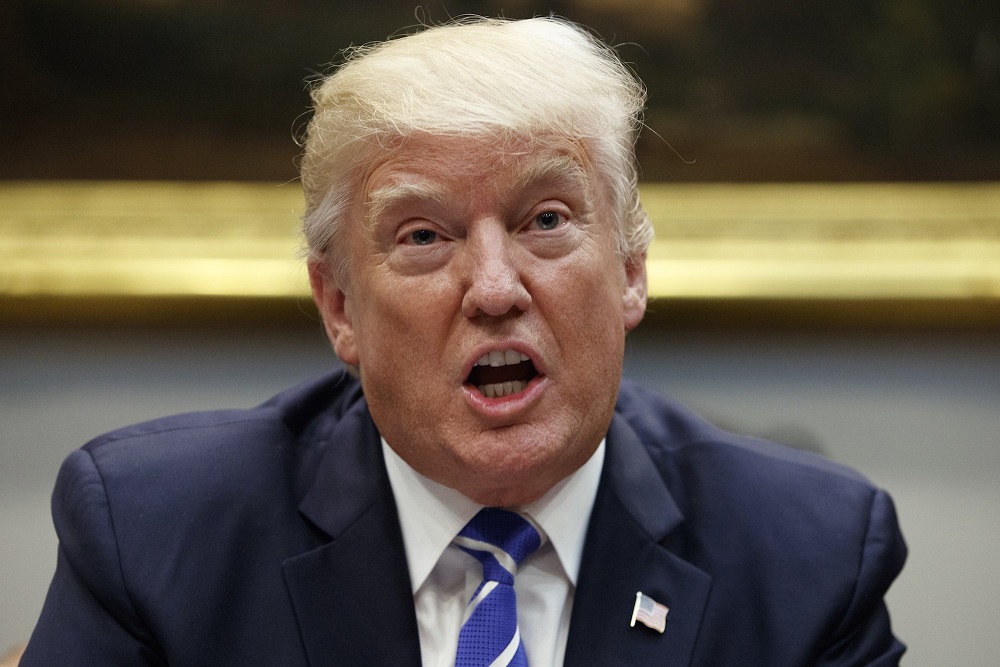U.S. senators on Tuesday probed the limits of a president’s unilateral power to launch a nuclear attack, as tensions rise between Donald J. Trump and North Korean leader Kim Jong-Un.
The closely watched discussion, led by a prominent Republican Trump critic, addressed a hypothetical presidential decision to launch a nuclear first strike against a U.S. adversary.
“Let’s just recognize the exceptional nature of this moment,” Senate Democrat Chris Murphy said during the hearing of the chamber’s Foreign Relations Committee.
“We are concerned that the president of the United States is so unstable, is so volatile, has a decision-making process that is so quixotic, that he might order a nuclear weapon strike that is widely out of step with US national security interests,” he added.
Chris Murphy: "We are concerned that the President of the United States is so unstable, is so volatile… that he will order a nuclear weapons strike" that isn't warranted. pic.twitter.com/izGDZUAyJ4
— Kyle Griffin (@kylegriffin1) November 14, 2017
In the event of an ongoing or imminent nuclear attack, senators and expert witnesses agreed that the president had full authority to defend the nation in accordance with the U.S. Constitution.
Only the president can give the order to pull the nuclear trigger.
“Once that order is given and verified, there is no way to revoke it,” said the committee’s chairman, Senator Bob Corker, who described the hearing as the first since 1976 to focus on presidential authority over nuclear weapons.
Mr. Corker has broken publicly with Mr. Trump, warning last month that the president was setting the nation “on the path to World War III” with his statements about North Korea and verbal jousting with Mr. Kim.
Today at 10:00 a.m. ET, the #SFRC will hold a hearing on the executive’s authority to use nuclear weapons and the process for executing that authority. Watch here: https://t.co/kC9Jc2LEv3.
— Senator Bob Corker (@SenBobCorker) November 14, 2017
One issue under debate was the concept of imminent threat, when the president believes a country poses a threat significant enough for the U.S. to order a pre-emptive nuclear strike.
The three experts agreed that there was no strict definition of “imminent,” suggesting that a missile on a North Korean launchpad might qualify as imminent, but that other scenarios might be less clear.
Robert Kehler, who headed U.S. Strategic Command from 2011 to 2013, referred to a basic military precept: “The military is obligated to follow legal orders, but is not obligated to follow illegal orders.”
So, what constitutes a legal order? Mr. Kehler, a retired U.S. Air Force general, said the military principles of “necessity” and “proportionality” also apply to decisions about nuclear weapons.
But when asked what he would do if he determined that a presidential nuclear order was illegal, Mr. Kehler hesitated about such a hypothetical.
“I don’t know exactly,” he responded. “The human factor kicks in.”
In such a situation, said Bryan McKeon, a former undersecretary of defense under Barack Obama, the president could replace the commander in question, or even the secretary of defense.
“But you’d have a real constitutional crisis on your hands,” Mr. McKeon said.
The discomfort among some Republican senators was visible.
“Our adversaries are watching,” Senator Marco Rubio said, who warned against steps that raise any doubts about U.S. presidential authority in a conflict.
“In this republic, we have [presidential] elections, and one of the things that voters think about… is whether or not they want to trust him with this capability.”






















